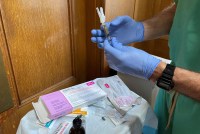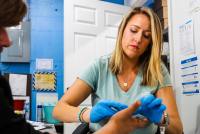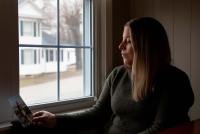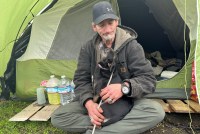Latest KFF Health News Stories
California Hospitals, Advocates Seek Stable Funding to Retain Behavioral Health Navigators
California has supported expanded use of medications in the fight against opioid use disorder and overdose deaths. But hospitals and addiction treatment advocates say the state needs to secure ongoing funding if it wants more behavioral health workers to guide patients into long-term treatment.
How a Friend’s Death Turned Colorado Teens Into Anti-Overdose Activists
High school students in Colorado are pushing for a change they say is necessary to combat fentanyl poisoning: ensuring students can’t get in trouble for carrying the overdose reversal drug naloxone wherever they go, including at school.
What the Health? From KFF Health News: Alabama’s IVF Ruling Still Making Waves
Lawmakers in Congress and state legislatures are scrambling to react to the ruling by the Alabama Supreme Court that frozen embryos created for in vitro fertilization are legally children. Abortion opponents are divided among themselves, with some supporting full “personhood” for fertilized eggs, while others support IVF as a moral way to have children. Rachel Cohrs of Stat, Riley Griffin of Bloomberg News, and Joanne Kenen of the Johns Hopkins University schools of nursing and public health and Politico Magazine join KFF Health News’ Julie Rovner to discuss these issues and more. Also this week, Rovner interviews University of Pittsburgh law professor Greer Donley, who explains how a 150-year-old anti-vice law that’s still on the books could be used to ban abortion nationwide. Plus, for “extra credit,” the panelists suggest health policy stories they read this week that they think you should read, too.
Mezcla letal: se extiende el uso de fentanilo con sedantes para caballos
La xilacina se utiliza para sedar a los caballos. Ahora la están mezclando con fentanilo. Es letal y la naloxona no frena las sobredosis.
California Takes Up White House Call to Toughen Gun Storage Rules
State lawmakers are weighing legislation that would require gun owners to keep their firearms locked up most of the time, a move advocated by the Biden administration.
Bathroom Bills Are Back — Broader and Stricter — In Several States
State lawmakers are resurrecting and expanding efforts to prohibit transgender people from using public restrooms and other spaces that match their gender. Some have sought to ban trans people from “sex-designated spaces,” including domestic violence shelters and crisis centers, which experts say could violate anti-discrimination laws and jeopardize federal funding.
Readers Call on Congress to Bolster Medicare and Fix Loopholes in Health Policy
KFF Health News gives readers a chance to comment on a recent batch of stories.
Hacking at UnitedHealth Unit Cripples a Swath of the US Health System: What to Know
Change Healthcare, a firm recently bought by insurance giant UnitedHealth Group, reportedly suffered a cyberattack. The company processes 14 billion transactions annually, including payments and requests for insurance authorizations.
Toxic Gas That Sterilizes Medical Devices Prompts Safety Rule Update
The Environmental Protection Agency is tightening regulation of ethylene oxide, a carcinogenic gas used to sterilize medical devices. The agency is trying to balance the interests of the health care industry supply chain with those of communities where the gas creates airborne health risks.
Si eres pobre, un tratamiento de fertilidad suele ser un sueño inaccesible
Pero las personas con ingresos más bajos, a menudo de minorías, tienen más probabilidades de estar cubiertas por Medicaid o por seguros limitados que no tienen esta cobertura.
The Supreme Court Confronts a Public Health Challenge: Homeless Encampments
Homelessness is a soaring public health crisis, with a record 653,000 unhoused people in the United States, according to federal estimates. Tent and recreational vehicle encampments have exploded in recent years, crowding streets and sidewalks from Portland, Ore., to New York. In California, where roughly a third of all the nation’s homeless people live, doctors […]
Say That Again: Using Hearing Aids Can Be Frustrating for Older Adults, but Necessary
Hearing loss is more than a nuisance. It also raises the risk of cognitive decline, dementia, falls, depression, and social isolation.
California Lawsuit Spotlights Broad Legal Attack on Anti-Bias Training in Health Care
State laws requiring doctor training on how bias affects treatment violate teachers’ right to free speech, opponents say.
An Arm and a Leg: Wait, Is Insulin Cheaper Now?
Did the price of insulin go down? It’s not quite that simple. On this episode of “An Arm and a Leg,” producer Emily Pisacreta explores recent changes to the cost of the diabetes medication.
A Government Video Would Explain When Abortion Is Legal in South Dakota
South Dakota allows doctors to terminate a pregnancy only if a patient’s life is in jeopardy. Lawmakers say a government-created video would clarify what that exception actually means.
Without Medicare Part B’s Shield, Patient’s Family Owes $81,000 for a Single Air-Ambulance Flight
Sky-high bills from air-ambulance providers have sparked complaints and federal action in recent years. But a rural Tennessee resident fell through the cracks of billing protections — and a single helicopter ride could cost much of her estate’s value.
If You’re Poor, Fertility Treatment Can Be Out of Reach
For low-income people who are on Medicaid or whose employer health plan is skimpy, help for infertility seems unattainable.
Horse Sedative Use Among Humans Spreads in Deadly Mixture of ‘Tranq’ and Fentanyl
Illegal supplies of fentanyl are being cut with xylazine, a powerful horse tranquilizer. Overdoses involving this veterinary sedative are growing nationally and now Florida officials are tracking the deaths.
California Gov. Newsom Wants Voters to Approve Billions More to Help the Homeless. Will It Help?
A March 5 ballot initiative seeks $6.4 billion to build thousands of new housing units and provide mental health treatment for homeless people — on top of the billions already being spent to address the public health crisis. Despite significant support from health and law enforcement officials, many front-line workers are skeptical that more money is the answer.
Brote de sarampión: Florida dice que niños no vacunados pueden ir a la escuela, desafiando a los CDC
La mayoría de las personas que no están protegidas por una vacuna contraerán sarampión si se exponen al virus. Existe riesgo de muerte.




















